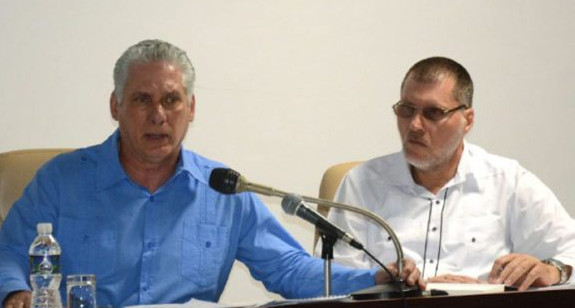
![]() 14ymedio, Elías Amor Bravo, Economist, 16 November 2023 — The Cuban communists, since the early days of Fidel Castro, never willingly accepted the phenomenon of the cooperative movement and never gave it the deserved space it should have had, especially in the agricultural sector.
14ymedio, Elías Amor Bravo, Economist, 16 November 2023 — The Cuban communists, since the early days of Fidel Castro, never willingly accepted the phenomenon of the cooperative movement and never gave it the deserved space it should have had, especially in the agricultural sector.
The origin of cooperativism in Cuba after the revolution was precarious. The few farmers who retained small plots of land, after the structural transformations of the so-called “agrarian reform,” understood that cooperativism could be a determinant of the productive efficiency of their lands.
And so a system of small cooperatives emerged on the Communist Island, of local implementation, which soon fell under the political control of the regime through the National Association of Small Farmers (ANAP). Immediately the communist leaders were at the head of these cooperatives, and any possibility of development, growth or improvement of these entities fell into oblivion. For more than 50 years, the Cuban cooperative sector was the closest thing to a private initiative in the Marxist interventionist desert, and therefore, it never managed to take off.
Sixty years later, the existing economic model on the Island still does not accommodate the cooperative movement, which struggles to occupy positions of power without success. And now, it has occurred to the communist leaders that cooperativism, in addition to being oriented to producing food and goods and services, has to be dedicated to a participatory task that they call “community transformation.” To that end, “cooperatives must have a humanistic approach and social responsibility for the environment.” Unfortunately, we are very afraid this will give the death blow to the sector.
The hilarious idea that cooperatives be in charge of community transformation and that they are responsible for the environment, arose precisely during the second day of the XIV International Meeting of Economists on Globalization and Problems of Development, which is being held at the Convention Palace in Havana. Colleagues want to believe in it, but they can’t. They know that the economic model is useless, and they propose its replacement, but then they dedicate themselves to these flowery games that do not lead anywhere because they only serve those who run the country and reject any real change. It should not be expected that any leader put to sleep by these messages will take sides so that the cooperatives produce more and serve the interests of the population.
The Support for Agricultural Intercooperation (Apocoop) project cited by the state press, establishes a route “to strengthen the development of agriculture and the social responsibility of cooperatives for their environment” and has an active presence in four provinces of the country – Artemisa, Sancti Spíritus, Las Tunas and Guantánamo – benefiting a population of more than one million inhabitants, of which 46% are women.
The question is immediate: has anyone in those four provinces seen their diet improved with Apocoop? Do you eat more and better? It would be good to get that information, because otherwise, we return to the debate about the means or the ends, which the communists like so much, but which does not serve to produce more and better, which is what the country needs.
Apocoop has served to contribute, they say, about a million pesos, which has been destined to “improve the living conditions of the communities in which they are located, mainly with the rehabilitation of basic service spaces and the realization of local food self-sufficiency.”
The immediate question is, what about the necessary capitalization for cooperatives to be able to invest more and better, and continue to grow? Does it vanish in “help”? It should be remembered that nothing is free, and that if a group of workers join to promote a cooperative, their objective is to improve their economic and social situation; that is, to earn money and make their project profitable.
Let’s imagine what can happen if the local communist leader tells them to forget that, the money has to be allocated to social and community responsibility. When the cooperative members see that this happens two years in a row, the cooperative is over and everyone goes home. And then they talk about the blockade of the United States, when the real blockade is internal.
There was also talk of promoting “other regulatory frameworks that lead the path of cooperativism and the promotion of second-degree cooperatives with powers to diversify their activities.” As it is unknown what regulatory framework they are talking about, in these cases it is better to leave things as they are before embarking on changes that may end up giving worse results.
It seems to me that the representatives of cooperatives from Mexico and the Dominican Republic attending the event took a fairly objective impression of the daily reality of the Island, in case there was any doubt, along with the entrepreneurs who visit international fairs and competitions on the Island but never return.
Communist leaders have no remedy. They don’t even trust cooperatives anymore. They want them submissive and obedient. They play with fire.
Translated by Regina Anavy
____________
COLLABORATE WITH OUR WORK: The 14ymedio team is committed to practicing serious journalism that reflects Cuba’s reality in all its depth. Thank you for joining us on this long journey. We invite you to continue supporting us by becoming a member of 14ymedio now. Together we can continue transforming journalism in Cuba.
